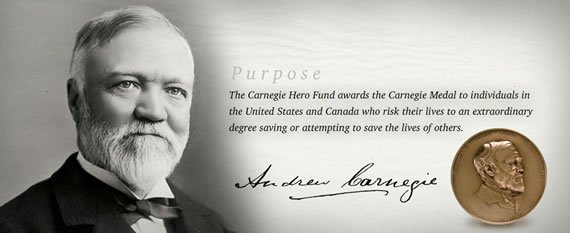
Prompted by the 1904 Harwick Pennsylvania mine disaster, one of the worst coal mining accidents in U.S. history, Andrew Carnegie established the Carnegie Hero Fund Commission to recognize acts of civilian heroism. After seeing Selwyn M. Taylor, an eminent mining engineer, and Daniel A. Lyle, a coal miner, answer the call for rescue workers at Harwick and lose their lives, Carnegie commissioned a medal to honor them. Three months after the disaster, Carnegie established the organization with $5 million of his own money (formalized through a deed of trust), to provide financial assistance to “citizen heroes” who were disabled by acts of heroism and the dependents of those killed helping others.
"We live in a heroic age," Carnegie wrote at the time. "Not seldom are we thrilled by deeds of heroism where men or women are injured or lose their lives in attempting to preserve or rescue their fellows; such the heroes of civilization."
Today, the Carnegie Hero Fund Commission continues Andrew Carnegie’s mission of recognizing selfless acts of heroism by ordinary citizens by awarding the Carnegie Medal to civilian heroes throughout the United States and Canada. Over the organization’s lifetime, the Fund has awarded close to 10,000 medals and tens of millions in grants, scholarships, and general assistance. There are now several hero funds throughout Europe and the United Kingdom.
